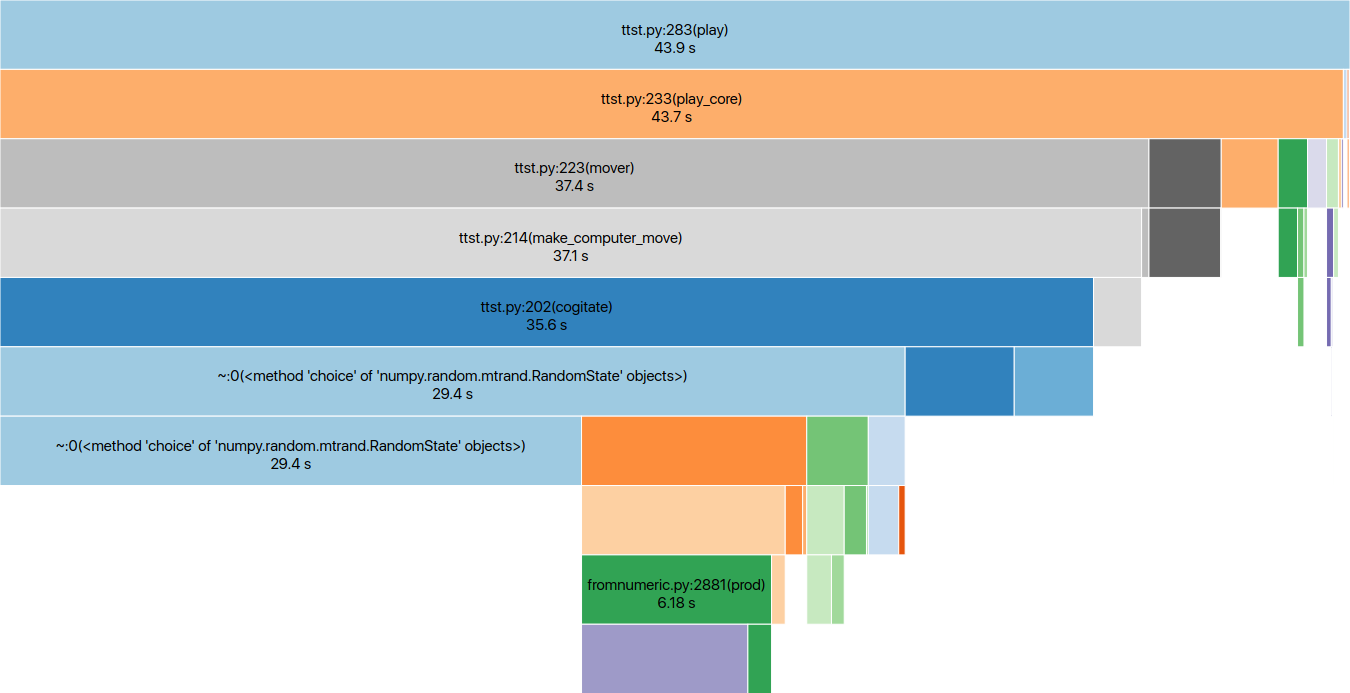
In a previous blog post I have presented TTST, a Python program that trains itself to play Tic-Tac-Toe. Now I want to make it go faster.
I will present a flame chart, a graphical represention of total computation time aggregated by function calls. Reading top-down we can see all the function calls made while training, going from main() down to the most low-level routines.
Here TTST is training 100’000 matches against itself, with a total runtime of 44 seconds:

We can notice that most of the time is spent running the function cogitate():
def cogitate(state, brain_map):
weights = brain_map[state] / sum(brain_map[state])
return np.random.choice(9, 1, p=weights)[0]
The culprit is random.choice() from Numpy, we use it to select the next move on the tic-tac-toe board: to balance exploitation and exploration, the moves are picked at random, but the probability distribution is updated after each match to reward moves that have won games.
The variable brain_map is a big dictionary holding a probability distribution for each possible game state. (Illegal moves, i.e. picking a spot already taken on the board, have their probability hardcoded to zero.)
The function is quite efficient, but here the overheads are massive. I haven’t looked at the Numpy internals, but it seems that there is quite a bit of setup time before the actual (fast and efficient) computation is done. And since here we are doing many small iterations of random.choice(), all this setup time adds up.
We will use the rand library to replace the random.choice() function.
First let’s look at a proof of concept:
use rand::prelude::*;
use rand::distributions::WeightedIndex;
fn cogitate(weights: Vec<i32>) -> i32 {
let choices = [0,1,2,3,4,5,6,7,8];
let dist = WeightedIndex::new(&weights).unwrap();
let mut rng = thread_rng();
choiches[dist.sample(&mut rng)]
}
Here weights is the equivalent of brainmap[state] as seen in the Python code above. Note that WeightedIndex does not require the weights to be normalized to 1,
for more information see the docs on WeightedIndex.
Now we will leverage rust-cpython to execute the Rust function from inside the main Python program.
The rust-cpython library requires this kind of structure:
fn rust_to_python(_: Python, arguments: T1) -> PyResult<T2> {
let result: T2 = do_something(arguments);
Ok(result)
}
where T1 is a Rust type that implements the cpython::FromPyObject trait.
So we rewrite our functions to fit. Here is the final Rust:
fn choose (_: Python, weights: Vec<i32>) -> PyResult<i32> {
let choices = [0,1,2,3,4,5,6,7,8];
let dist = WeightedIndex::new(&weights).unwrap();
let mut rng = thread_rng();
Ok(choices[dist.sample(&mut rng)])
}
and the final Python:
from chooser import choose
def cogitate(state, brain_map):
weights = brain_map[state]
return choose(weights)
The Rust-boosted version is more than 6 times faster overall, with a total runtime of 6.45 seconds.

Of course the only change is in the cogitate() function: the new version runs just for 1.79 seconds as opposed to the original 35.6 seconds. Twenty times faster!
Don’t forget the rust-cpython boilerplate:
use cpython::{Python, PyResult, py_module_initializer, py_fn};
// Here `chooser` is the name of the Python module
py_module_initializer!(chooser, |py, m| {
m.add(py, "choose", py_fn!(py, choose(weights: Vec<i32>)))?;
Ok(())
});
We also need to add this to our Cargo.toml:
[lib]
name = "chooser"
crate-type = ["cdylib"]
[dependencies]
rand = "0.7"
[dependencies.cpython]
version = "0.5"
features = ["extension-module"]
Finally we can generate libchooser.so by running $ cargo build --release. This file must be renamed to chooser.so, otherwise it won’t be recognized by Python.
Try it out yourself, complete working code is on GitHub!